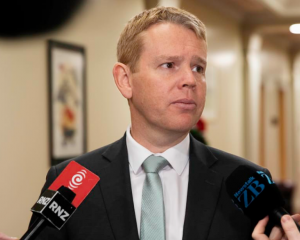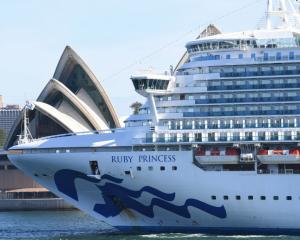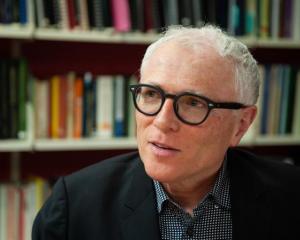Trade expert Charles Finny has warned that the impact of Covid-19 crisis could see New Zealand even more dependent on China and agriculture.
Finny, a Wellington lobbyist and former diplomat, told MPs on the Epidemic Response Committee that the impact of Covid-19 was already having a major impact on the economy.
"We will be even more dependent on one market and one sector, China and agriculture, than we were before the crisis."
This, he said, could be exploited by China which had previously used trade dependency for political purposes.
Finny is among a line-up of experts speaking today to the Epidemic Response Select Committee.
Alongside an appearance by Reserve Bank governor Adrian Orr, who has been overseeing a series of actions to try to maintain the stability of the banking sector, the committee is focusing on trade.
Finny is appearing as an independent witness, before Trade Minister David Parker and New Zealand's chief trade negotiator Vangelis Vitalis as well as Economic Development Minister Phil Twyford and NZ Trade and Enterprise chief executive Peter Chrisp.
Finny told MPs that New Zealand needed a 10 point plan to restart trade, including an immediate resumption of manufactured exports and logging.
He warned if we did not do so soon, New Zealand companies would lose contracts. New Zealand's wellbeing was reliant on international trade, however this would be difficult to increase at a time of a global recession.
This in turn would lead to a loss of shipping lines which would in turn further harm New Zealand's agricultural exports.
New Zealand should also reopen its coal and gold exporting business.
Finny also called for a "supercharging" of Government efforts to boost exports from the Māori economy, which he expected to be hit hard by Covid-19.
"Obviously if China's buying we sell as much as we can" but as the global economy improved we should make attempts to diversify.
Manufactured exports, worth around $9 billion a year, were at risk of losing global contracts if they were not allowed to restart quickly.
"A lot of companies will survive a four week lockdown, but if it goes on much longer, they won't." Some would fail even after four weeks.
While he supported more local processing of logs, he said New Zealand could not afford to lose export sales through adopting some sort of export levy on log exports.
Finny warned that trade appeared to be starting to seize up in Europe, the United Kingdom, the west coast of the United States and even Japan.
While trade continued with ASEAN countries as well as China, Taiwan, Korea and Australia, the overall picture in the next six months was difficult.
"I think we're looking at a very challenging time."
There were signs of increasing protectionism, including within the European Union. New Zealand should work hard to build trade links, including a free trade agreement with the UK.
"The best thing New Zealand can do in response to rising protectionism" was negotiating more free trade deals and respect international rules.
He had not yet seen evidence of New Zealand companies losing market share internationally, and he believed that if manufacturing was allowed to restart soon, he did not believe damage would be lasting. But if the lockdown went on, lasting damage would be done.
Reserve Bank boss Adrian Orr
Reserve Bank governor Adrian Orr has told MPs that the financial system is sound, but can only play a support role to Government spending.
Orr and his colleagues are appearing before MPs on the Epidemic Response Select Committee.
Deputy governor Christian Hawkesby, earlier told MPs that the central bank had not only cut the official cash rate and undertaken a large scale asset purchase scheme to help drive down interest rates, but also ensuring there was ample cash, not only in its vault, but around the country to keep cash machines working.
Orr said the banks were well capitalised and would always have the cash to lend, if there was demand.
"They are in a position where they will be part of the solution," not only in the short term but also in the recovery.
But Orr said the main response would be Government spending.
"This is primarily a fiscal policy challenge."
He urged banks to be "courageous" and consider the long term interests of clients.
The biggest concern for the banks was not growth or asset prices, but high unemployment.
Banks held about $100 billion in capital more than the statutory minimum, but long term high unemployment was likely to be a problem, Orr said.
Orr said the steps the central bank had taken had meant "interest rates across the board have come down significantly".
Hawkesby said international evidence suggested a scheme on the scale of the central bank's quantitative easing programme suggested it would be equivalent to a reduction of the official cash rate of around 150 basis points.
Asked by National's finance spokesman Paul Goldsmith how he wanted banks to behave, given the legal requirements banks operate under, Orr said "customers are long term relationships".
A Government-backed business loan scheme meant the Government was putting up 80% of the risk of working capital loans to businesses. The banks should go out and lend the money but "use it with your eyes wide open".
Hawkesby said as a rule of thump, level four restrictions would cut economic activity by around 35%, level three would cut activity by 20-25%, level two 10% and level one 5%.
Whatever the scenario there would be "very weak economic activity" and a sharp rise in unemployment.
Questions to ministers
Economic Development Minister Phil Twyford told MPs that while some companies had seen an increase in demand, around 70% of manufacturing exporters were shut down. The impact was especially hard on small businesses.
Trade Minister David Parker said while the coming period was going to hit the services sector hard, with a sharp drop in tourism and international education likely, New Zealand was fortunate to have a large food producing industry.
"Arguably, we're going to be better positioned than some," Parker said.
Trade officials had observed what was happening in China in January and began focusing on the issue back then.
Parker said it was a reasonable conversation for countries to assess whether they were too dependent on international supplies of protective gear and reagents and testing kits, but should be careful not to allow that to spill over to protectionism.
Parker refused to be drawn on whether the Government would consider a levy on log exports, as has been suggested. He supported ensuring the local processing industry had supply but said no decision had been made.
Committee chairman Simon Bridges said he had been emailed this morning by a "prominent" forestry company saying the industry needed to be allowed to restart operations.
Twyford said a number of industries had lobbied to be included as essential services.
"Everyone's alive to the economic impact of that. No one needs to be schooled on that."
Former trade minister Todd McClay asked if construction, logging and manufactured exports would be able to operate under level three restrictions.
Twyford said the Prime Minister would make an announcement soon but repeated Finance Minister Grant Robertson's statement that it would be about "safety". He refused to give specific details.
Chief trade negotiator Vangelis Vitalis
Vangelis Vitalis, chief trade negotiator at the Ministry of Foreign Affairs and Trade, said there was a concerning trend towards protectionism in food, as countries became more concerned about food supplies, even though it was clear the best way to ensure supplies was through cooperation.
Vitalis said companies were raising seven concerns: The definition of essential services; how a company could sustain when it cannot operate but others can; how the slowdown would impact the companies that would rely on them; how freight would operate; rising protectionism; the loss of trade architecture and how officials would help them remove barriers when people cannot travel.
NZTE chief Peter Chrisp
New Zealand Trade and Enterprise chief executive Peter Chrisp said the main concern for the organisation was for manufactured exporters.
Markets were often "very hard won" but were under threat as rival companies could continue to operate.
"Tait [Electronics] competes with Motorola, Hamilton Jet competes with Rolls Royce, Glidepath competes with Honeywell."
Parker confirmed the Government was considering changes to the Overseas Investment Act, similar to what has happened in Australia, to attempt to protect against the risk of predatory purchases of distressed assets.
Comments
"Parker confirmed the Government was considering changes to the Overseas Investment Act, similar to what has happened in Australia"
This must be done !!!
We are a small country easily exploited by those with deep pockets, like Chinese government backed 'companies'.
Getting into bed with the 'Reds' is always a dangerous business and we should never forget that.










